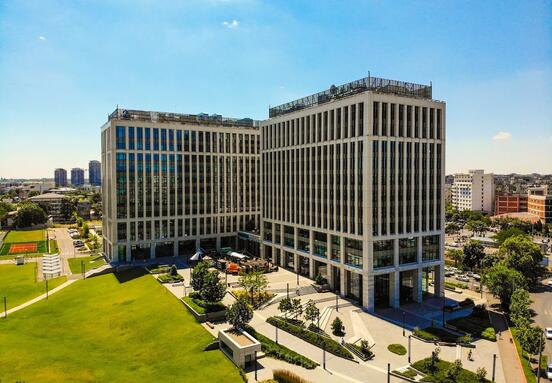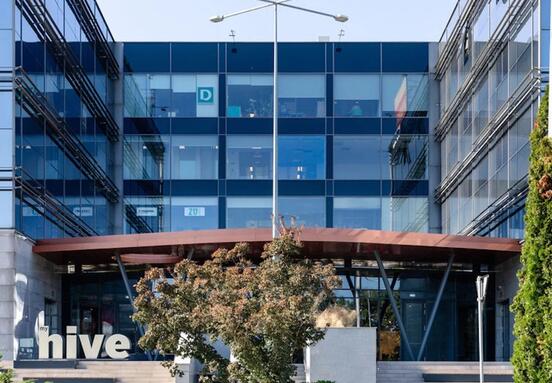The total office stock in the four analyzed regional cities is 450,000 sq. m, five times smaller than in Bucharest. With 150,000 sq. m offices, mostly class B, Cluj Napoca is the leader, followed by Iasi with 120,000 sq. m, Timisoara with 100,000 and Brasov with 80,000 sq. m.
The total volume of the spaces to be delivered in 2014 in the four cities is 52,000 sq. m. Cluj Napoca is leading the way with an announced volume of 42,000 sq. m of modern office spaces, including the completion of the first phase of The Office project (19,000 sq. m) developed by NEPI, United Business Center Tower (10,000 sq. m) developed by Iulius Group and the second phase of Liberty Technology Park (11,400 sq. m) developed by Fribourg Investment. In Iasi and Timisoara the delivery of 10,000 sq. m and 9,000 sq. m respectively is announced, and in Brasov the next delivery for new offices is announced for 2015.
If all the announced projects would be delivered, the modern office stock in Cluj Napoca will double by 2016, reaching 300,000 sq. m.
The level of rents for A class offices is similar in Cluj Napoca, Timisoara and Brasov, fitting the range of EUR 12 – 14/sq. m/month, with a slight difference in Iasi, where the A class offices rent is EUR 13.5 – 15/sq. m/month. Regarding the rents for B class, it ranges between EUR 7-11/sq. m/month in all the analyzed cities.
The vacancy rate for A class offices is less than 10% in Cluj, Timisoara and Iasi, slightly higher in Brasov, up to approx. 15%. This vacancy rate registered in A class offices in Brasov also justifies the decision of the developers to slow down the developments rate this year.
The request for offices is mostly generated by companies active in financial, technologic and telecom fields. Cluj Napoca was considered in recent years the second attractive city after Bucharest for BPOS and SSCS. Due to competitive salaries, young population mostly including students and the occupancy costs, the city was chosen as office destination by companies such as Genpact, Endava, Atlas Telecom, Evalueserve, Skyes Enterprises, HP, Siemens, Intel, SAP, Bombardier, Pentalog.
The city of Iasi, due to a good telecommunications infrastructure, competitive salaries and high volume of educated workforce, became the second attractive regional city after Cluj Napoca, for companies targeting to open BPO, R&D and SSC operational centres.
In Timisoara the office request mostly comes from the technologic and telecom sectors (Alcatel, TeamNet, Three Pillar Global, IBM, Vodafone, SAP), financial (Deloitte , PWC, Raiffeisen, BCR ) and production/automotive (Flextronics, Autoliv, Smithfield Foods).
,,Major players on corporate market with offices opened in Bucharest also oriented towards regional cities in recent years in order to expand their operations, being motivated by the educated workforce, the salary level or total rental costs. For instance, the occupancy costs (Rent + service charge) of A class offices in regional cities are approx. 20% - 25% lower than in Bucharest. For the companies operating in the technologic and telecom fields, occupying generous areas, choosing a location in a regional city is a option which generates economic advantages on long term’’, comments Madalina Cojocaru, Head of Office Department, DTZ Echinox.
All the four cities analyzed are also university centres which generate competitive and qualified workforce. Most young population speaks English and French, those being the most popular languages in the mandatory school curricula. However the large companies could also find here Russian, Portuguese, German, Hungarian, Swedish, Polish, Turkish, Greek, Arabian speakers, educated in foreign languages faculties, o valuable source of linguistic capacities being also represented by the ethnic groups in these cities.
Another important argument, with major influence in companies’ decision to open spaces in secondary cities is represented by the labour costs. The salary expectancies of the graduates with less than a year experience in workforce market vary between EUR 250 and EUR 275 for those with economic studies and EUR 350-375 for the IT and Polytechnics graduates. The net salaries practiced in the four analyzed cities varies between EUR 250 and EUR 275 for an client service employee with less than 2 years experience and EUR 700 – EUR 900 – the net salary of a programmer with less than 3 years experience.
Data regarding the workforce costs and the foreign languages speakers included in the report were supplied by the company Brainspotting Romania. (source: dtz.ro)






